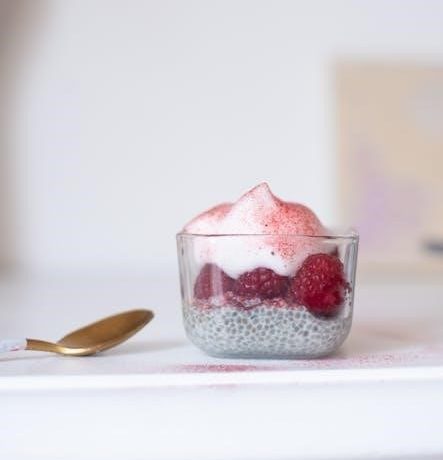Discover the power of diet in reducing inflammation with our comprehensive guide. Learn how foods like berries‚ fatty fish‚ and leafy greens promote long-term well-being. Download the anti-inflammatory food list PDF for easy reference and start your journey to better health today!
Overview of Chronic Inflammation and Its Impact on Health
Chronic inflammation is a sustained immune response that can damage healthy tissues and contribute to conditions like arthritis‚ heart disease‚ and diabetes. It disrupts the body’s balance‚ leading to pain‚ fatigue‚ and organ dysfunction. Addressing chronic inflammation is crucial for preventing long-term health complications and improving overall well-being. Understanding its causes and effects helps individuals adopt strategies‚ such as dietary changes‚ to mitigate its impact and promote healing.
Importance of Diet in Reducing Inflammation
Diet plays a pivotal role in managing inflammation by providing essential nutrients that help regulate the immune response. Anti-inflammatory foods like fruits‚ vegetables‚ and omega-3 rich fish can suppress inflammatory pathways‚ while processed and high-sugar foods exacerbate inflammation. A well-balanced diet not only reduces inflammation but also supports overall health‚ improving energy levels and reducing the risk of chronic diseases. Incorporating anti-inflammatory foods into daily meals is a proactive step toward achieving long-term well-being and preventing illness.
Top Anti-Inflammatory Foods
Anti-inflammatory foods include fruits like berries and cherries‚ vegetables such as leafy greens‚ and fatty fish rich in omega-3s. These foods help reduce inflammation and promote overall health. Discover a detailed list in the anti-inflammatory food list PDF for easy reference and meal planning.
Fruits: Berries‚ Cherries‚ and Citrus Fruits
Berries‚ such as blueberries‚ raspberries‚ and strawberries‚ are packed with antioxidants like anthocyanins‚ which reduce inflammation. Cherries contain quercetin and ellagic acid‚ known for their anti-inflammatory properties. Citrus fruits‚ including oranges and lemons‚ are rich in vitamin C and hesperidin‚ which support immune function and combat inflammation. Incorporating these fruits into your diet can help lower chronic inflammation and improve overall health. Refer to the anti-inflammatory food list PDF for more detailed recommendations on portion sizes and preparation methods.
Vegetables: Leafy Greens‚ Cruciferous Vegetables‚ and Sweet Potatoes
Leafy greens like spinach and kale are rich in antioxidants and fiber‚ which help reduce inflammation. Cruciferous vegetables‚ such as broccoli and Brussels sprouts‚ contain sulforaphane‚ a compound with potent anti-inflammatory effects. Sweet potatoes are high in beta-carotene‚ a precursor to vitamin A that supports immune health and reduces inflammation. These vegetables are essential additions to an anti-inflammatory diet and are highlighted in the anti-inflammatory food list PDF for their numerous health benefits.
Fatty Fish and Omega-3 Rich Foods
Fatty fish like salmon‚ mackerel‚ and sardines are rich in omega-3 fatty acids‚ particularly EPA and DHA‚ which are potent anti-inflammatory agents. These fats help reduce inflammation by balancing inflammatory responses in the body. Omega-3 rich foods are highlighted in the anti-inflammatory food list PDF for their ability to support heart health and combat chronic inflammation. Incorporating these into your diet can provide long-term benefits for overall well-being and inflammation management. They are a cornerstone of anti-inflammatory nutrition.
Whole Grains: Oats‚ Quinoa‚ and Whole Grain Bread
Whole grains like oats‚ quinoa‚ and whole grain bread are rich in fiber‚ vitamins‚ and minerals that help reduce inflammation. They are highlighted in the anti-inflammatory food list PDF for their ability to support digestive health and provide sustained energy. These grains are excellent sources of antioxidants and phytonutrients‚ which play a role in combating chronic inflammation. Incorporating them into your diet can enhance overall well-being and aid in managing inflammation effectively. They are a nutritious and essential part of an anti-inflammatory diet.
Herbs and Spices with Anti-Inflammatory Properties
Herbs like turmeric‚ ginger‚ and garlic are renowned for their anti-inflammatory effects. They contain compounds that reduce inflammation and enhance overall health when added to meals.
Turmeric‚ Ginger‚ and Garlic
Turmeric‚ ginger‚ and garlic are powerhouse spices with potent anti-inflammatory properties. Turmeric contains curcumin‚ which reduces inflammation and improves symptoms in chronic conditions. Ginger’s active compound‚ gingerol‚ fights inflammation and aids digestion. Garlic‚ rich in allicin‚ has antibacterial and anti-inflammatory effects. These spices are easily incorporated into meals‚ offering natural ways to combat inflammation. Studies highlight their effectiveness in reducing inflammation and improving overall health‚ making them essential additions to an anti-inflammatory diet.
Cinnamon‚ Rosemary‚ and Basil
Cinnamon‚ rosemary‚ and basil are flavorful herbs with anti-inflammatory properties. Cinnamon contains cinnamaldehyde‚ which reduces inflammation and improves insulin sensitivity. Rosemary’s carnosic acid fights oxidative stress‚ while basil’s eugenol has antibacterial and anti-inflammatory effects. These herbs are versatile‚ enhancing dishes from soups to meats. Incorporating them into meals not only adds flavor but also supports long-term health by reducing inflammation naturally. Their aroma and taste make them ideal for daily use in various culinary creations‚ promoting well-being effortlessly.
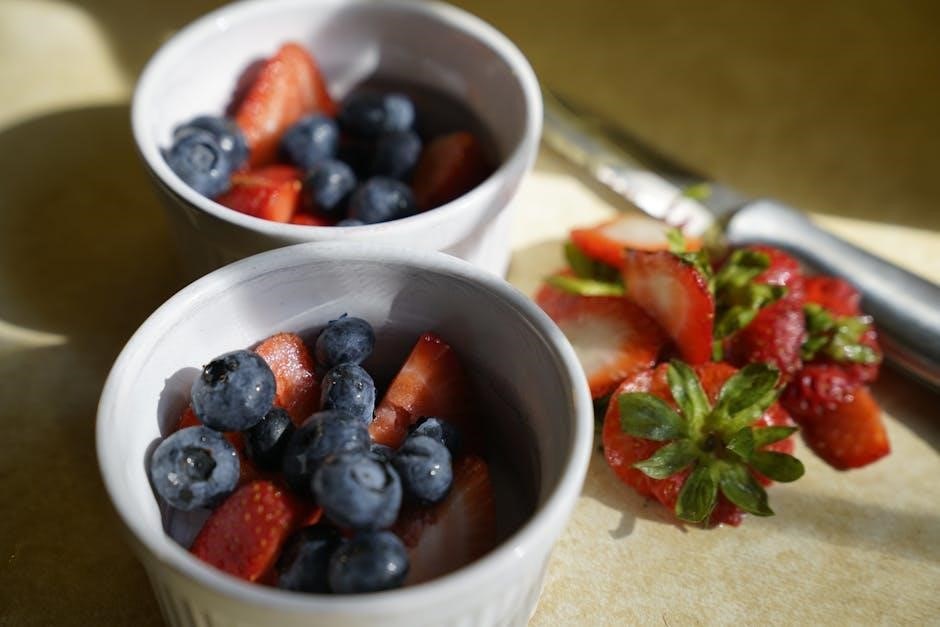
The Mediterranean Diet: A Model for Anti-Inflammatory Eating
The Mediterranean diet emphasizes whole‚ nutrient-rich foods like olive oil‚ fruits‚ vegetables‚ and whole grains‚ which help reduce inflammation and promote long-term health benefits.
Key Components of the Mediterranean Diet
The Mediterranean diet focuses on whole grains‚ fruits‚ vegetables‚ legumes‚ and healthy fats like olive oil. It emphasizes lean proteins such as fatty fish and poultry‚ while limiting red meat. Herbs and spices are used for flavor instead of salt‚ and moderate consumption of red wine is optional. This dietary pattern is rich in antioxidants and omega-3 fatty acids‚ which contribute to its anti-inflammatory effects. Regular physical activity complements the diet‚ enhancing overall well-being.
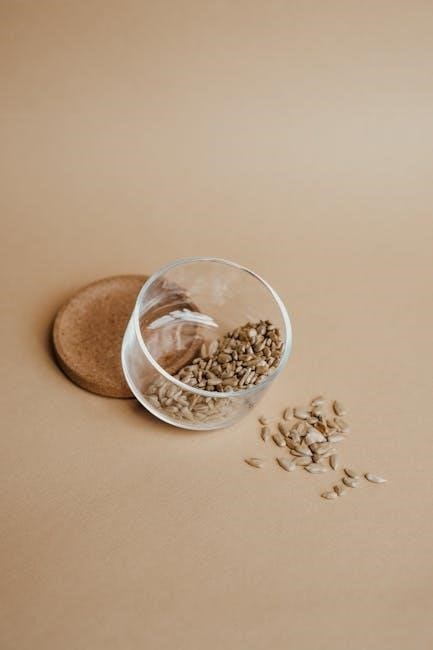
Benefits of Olive Oil and Red Wine in Moderation
Olive oil is rich in oleocanthal‚ which has potent anti-inflammatory properties‚ while red wine contains resveratrol‚ an antioxidant that helps reduce inflammation. Both support heart health and improve longevity when consumed in moderation. They enhance the Mediterranean diet’s benefits‚ aiding in chronic disease prevention and promoting overall well-being. Balancing these elements is key to maximizing their health advantages without overconsumption.
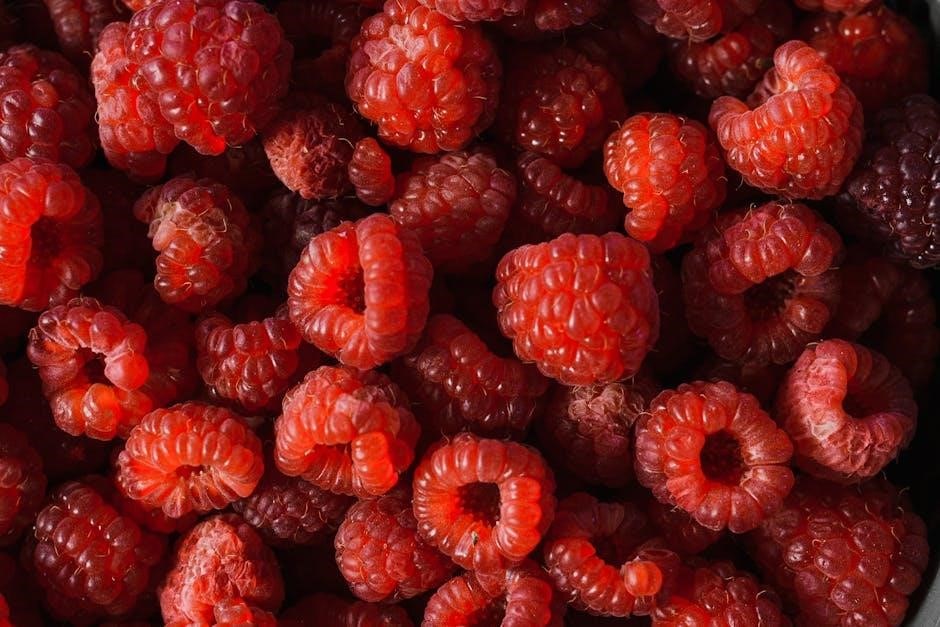
Meal Planning and Grocery Shopping Guide
Plan balanced meals using the anti-inflammatory food list PDF‚ ensuring essential nutrients and variety. Smart grocery shopping focuses on whole foods‚ seasonal produce‚ and healthy staples for optimal wellness.
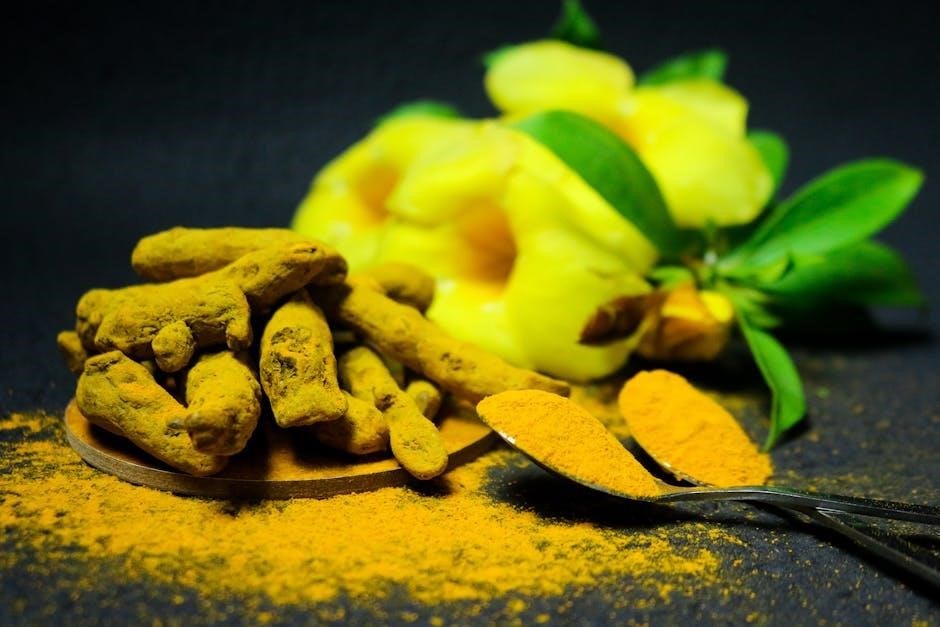
Sample Anti-Inflammatory Meal Plans
Breakfast: Oatmeal with berries and walnuts. Lunch: Grilled salmon with quinoa and steamed vegetables. Dinner: Sweet potato and black bean salad with avocado. Snacks: Apple slices with almond butter. These meals incorporate anti-inflammatory foods like omega-3 rich fish‚ fiber-rich whole grains‚ and antioxidant-packed fruits and vegetables. Refer to the anti-inflammatory food list PDF for more ideas and balanced nutrition. Consistency in meal planning helps maintain long-term health benefits and reduces inflammation effectively.
How to Use the Anti-Inflammatory Food List PDF
Download and print the anti-inflammatory food list PDF for easy reference while grocery shopping. Use it to plan meals‚ identify anti-inflammatory ingredients‚ and avoid pro-inflammatory foods. Organize your shopping list based on the categorized sections‚ such as fruits‚ vegetables‚ and whole grains. Keep the PDF handy to ensure consistent adherence to an anti-inflammatory diet. This guide simplifies meal planning and helps maintain a balanced‚ health-promoting diet for long-term wellness.
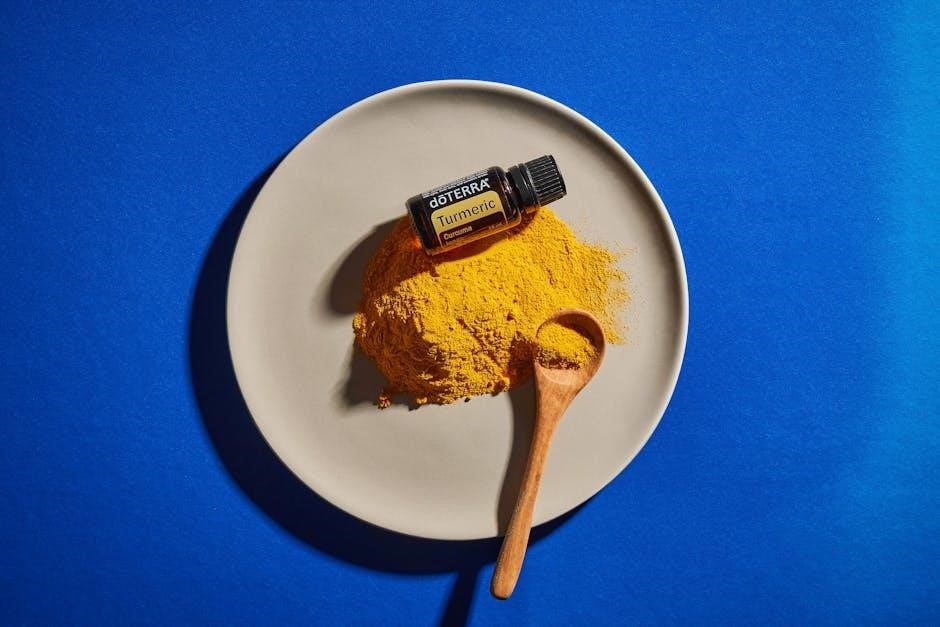
Foods to Avoid for Reducing Inflammation
Limit processed foods‚ sugary drinks‚ refined carbs‚ and red meat to reduce inflammation. Avoid excessive dairy and alcohol. Opt for whole‚ nutrient-rich foods instead.
Processed Foods‚ Sugary Drinks‚ and Refined Carbohydrates
Processed foods‚ sugary drinks‚ and refined carbs are known to trigger inflammation. They often contain unhealthy fats‚ added sugars‚ and artificial additives. These foods can lead to chronic inflammation‚ increasing the risk of conditions like heart disease and diabetes. Refined carbohydrates‚ such as white bread and pasta‚ cause rapid spikes in blood sugar‚ further promoting inflammation. Limiting these foods is essential for maintaining a balanced‚ anti-inflammatory diet. Opt for whole‚ nutrient-dense alternatives instead.
Dairy Products and Red Meat
Dairy products and red meat can promote inflammation due to saturated fats and pro-inflammatory compounds. While some dairy‚ like yogurt with live cultures‚ may have anti-inflammatory effects‚ excessive consumption can still trigger inflammation. Red meat‚ particularly processed varieties‚ contains advanced glycation end (AGE) products‚ which stimulate inflammatory pathways. Moderation is key‚ and opting for grass-fed or plant-based alternatives can help reduce inflammation. Limiting these foods supports an anti-inflammatory diet and overall health.
Embrace an anti-inflammatory diet to reduce chronic inflammation and enhance overall health. Download the anti-inflammatory food list PDF for a personalized guide to better well-being.
Implementing an Anti-Inflammatory Diet for Long-Term Health
A consistent anti-inflammatory diet is key to reducing chronic inflammation and improving overall well-being. Focus on whole‚ nutrient-dense foods like fruits‚ vegetables‚ and omega-3 rich fatty fish. Incorporate herbs and spices with anti-inflammatory properties‚ such as turmeric and ginger‚ into meals. Limit processed foods‚ sugary drinks‚ and refined carbohydrates to minimize inflammation triggers. Using the anti-inflammatory food list PDF as a guide can help streamline grocery shopping and meal planning for long-term success. Stick to the Mediterranean diet model for balanced‚ sustainable results.
Downloading and Using the Anti-Inflammatory Food List PDF
Download the anti-inflammatory food list PDF to easily identify and incorporate beneficial foods into your diet. This comprehensive guide categorizes foods‚ highlighting anti-inflammatory options like berries‚ leafy greens‚ and fatty fish. Use it for grocery shopping to ensure you select inflammation-reducing ingredients. Print the PDF for quick reference or save it digitally for convenient access. Referencing this list helps maintain a balanced diet‚ supporting long-term health and well-being through informed food choices.
